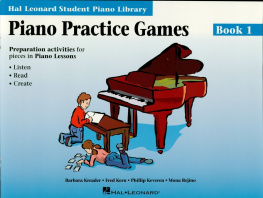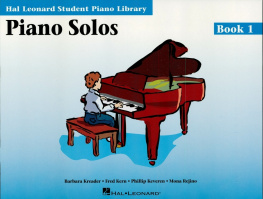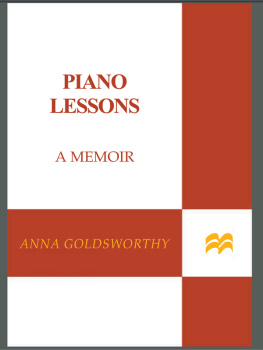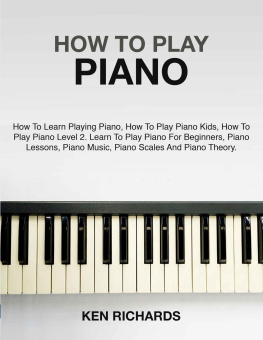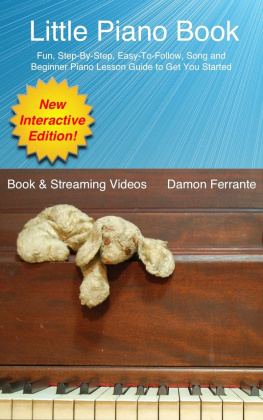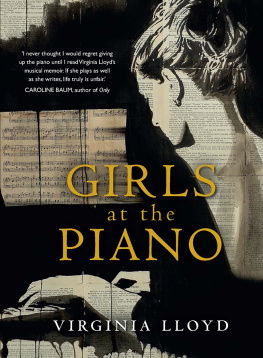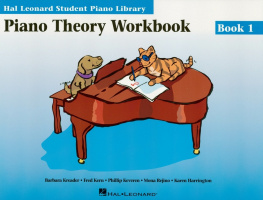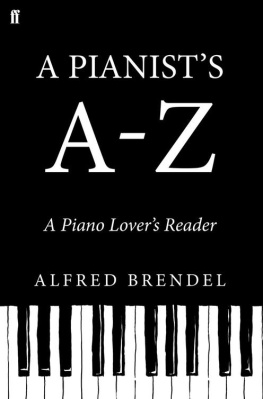Copyright 2013 Fred Kronacher
All rights reserved.
ISBN: 1481192442
ISBN 13: 9781481192446
eBook ISBN: 978-1-63001-229-8
Library of Congress Control Number: 2013900661
CreateSpace Independent Publishing Platform
North Charleston, South Carolina
DEDICATION
I dedicate this book to my mother Gretel, who loved music deep in her heart and sang to me when I was a baby. And to my father Gerald, who wouldnt let me quit when I wanted to as an adolescent. I also dedicate this journal to all the students Ive had the opportunity to work with over the years; among them, those that presently grace my home by their weekly visits Kate, Lewis, Henry, Kwang, Elle, Julian, Patrick, Iona, Nina, Tia, Shigeko, Casey, Aida, Selene, Munya, Gwen, Chelsea, Nancy, Karin, Dani, John, Yann, Sally,Madeleine, Mathew, Zhemin, Arnav, Sana, Yurina, Krithi.
Acknowledgements:
Cover Art- Cal Hynes-Hoffman
Editor- Charles Smyth
Photo- Megan Stacker
After silence, that which comes nearest to expressing the inexpressible is music
Aldous Huxley
TABLE OF CONTENTS
- written by Jess Smith
I have long believed, and have spent a long life seeking evidence for, the proposition that Life and Art are inextricably linked, and that a true and balanced success in either one is impossible without the other. In fact, we might say that one teaches, or informs, the other. Robert Henri, the great American Art Teacher, who had so much to do with connecting American artists with the Impressionistic movement in Paris, demanded from his students a firsthand emotion received not from art but from life.
Fred Kronacher, in his PIANO VARIATIONS: A musical voyage of self discovery takes us on that voyage with him, in a series of twenty-two vignettes drawn from his life, from early childhood when he discovers at the same time the wonders of piano playing and baseball, to his maturity as Pianist, Teacher, Lecturer, and Director of the Musical Experiences Foundation.
His admiration for great baseball players is comparable to his reverence for great pianists he hears and describes to us. The New York tabloid, THE DAILY NEWS, is a favorite newspaper because of its coverage of the Mets and Yankees games in New York. He perceives baseball in musical terms, in his description of hearing Mickey Mantle make that special music that comes from a perfectly timed powerful stroke of the bat, colliding with an oncoming baseball. The clean, fortissimo crack that ensues, and the rapidly rising legato flight of a small white ball against a blue, cloudless sky is a thing of beauty; one might call it lyrical. With only slight alteration, this could describe a virtuoso performance by Vladimir Horowitz.
We travel with him from his earliest experiences at the piano, which until college was simply a great love, through his decision to become a piano major at Ithaca College, through graduate study in New York at The Manhattan School of Music with Robert Goldsand, to his first steps in a career as a performing pianist and teacher. His in-depth discussion of his teaching is a how to book for ambitious young teachers. How does a sensitive mind with a formidable talent learn to focus on the sometimes reluctant student in a piano lesson? He learns, and promises himself that in future his students will have his complete presence in every lesson. This could be a description of how an actor prepares his performance for the stage.
He explores the universal themes of growing up, brushes with tragedy, the formation and loss of beautiful friendships, disappointments, human relationships, and the inner quest for understanding and harmony in life and art, all through the vehicle of the confrontation of Life and Self. It is at once an unabashed valentine to the art of Music, and to the mystery of Life itself.
The idea of presence is a theme throughout the book, whether in himself as teacher and performer, or experiencing it in other great artists he hears and describes in detail, baseball players he admires, friends who grace his life, or students who require his undivided attention. As he says so eloquently in the book, To light the lamp in the soul of ones neighbor is a privilege not given to everyone. A good teacher, once ignited himself, may pass the flame to another.
Reader, it comes to your hand
Jess Smith
Executive Director Emeritus
Brooklyn Conservatory of Music
I am a piano teacher. There are many thousands of us. We are found in the cities, towns, and villages of diverse lands, spread over the wide world. Musicians and teachers, we serve as links in a chain, keeping the melodies unfolding from generation to generation.
Most of us dont get rich or achieve great notoriety. We work in relative anonymity. Yet, we may make a deep and lasting impression upon our students. The motivated teacher-musician reaps a rich reward, not easily measured in a moneydriven society. To light the lamp in the soul of ones neighbor is a privilege not given to everyone. A good teacher, once himself ignited, may pass the flame to another.
Whether musicians or not, it seems that were all striving to be in greater harmony, arent we? We all prefer to play in tune. Now, I realize that Music is not the sole opening to the light. Harmony may be sought for down many of lifes myriad avenues. But what finer way to seek it than in music, the very art of harmony.
I recognize too, that music exists as part of life, not as the whole of life. It exists as a particularly luminous gem, capable of reflecting our ever shifting moods; even mirroring our aspirations to proceed from rivulet, churning torrent and rolling river to the vast, open sea. It is a universal language open to us all. Though harmony must necessarily be sought in music, it can also be sought in our other pursuits.
This memoir is not meant to be a comprehensive and revealing overview of my life. Instead, these pages are devoted to the musical trek I have embarked upon. My aim is to limit this set of variations to a single motif: that of music.
And as I am a man first, then a musician, I hope this book speaks of more than just the specific art of music. For while music is the special art of tones, rhythms, timbres, and harmonies, it is also the inner song of the soul, and as such it sings of all human experience.
The music started early. Though no single memory presents itself as being the very first, a distinct few stand out clearly. I know I was playing tunes with chordal accompaniments on the piano by the time I was five. In one vivid, early memory, Im playing the piano at some type of preschool in New Jersey. I remember playing songs by ear with pleasure and facility, surrounded by the presence of other five year olds. It felt like the most natural thing in the world. Finding melodies, feeling the rhythms, and searching out basic harmonies all came of itself. No one taught me.
I retain a host of early memories from my fifth and sixth years, playing an old upright piano at home in New Jersey. To the best of my recollection, the German folksong Mussi Denn was my first success as a pianist. This was my fathers favorite tune. I played it in C Major; the right hand took the melody, the left covered the harmony, employing basic I, IV, and V chords. It excited my father to no end that I could play this song.
Strauss waltzes soon followed. My mother Gretel, who lived the first 18 years of her life in Vienna, adored the Waltz King. Before long I was playing an assortment of pieces on the piano and receiving effusive praise from my parents, neighbors, and relatives. The accolades swelled my little head. Gerald and Gretel were thrilled by my nascent musical bursts. My Aunt Litzi pronounced me a genius. How was I to know that she was wrong? Music was so much fun. It moved and delighted me so. Maybe I was something extraordinary.


